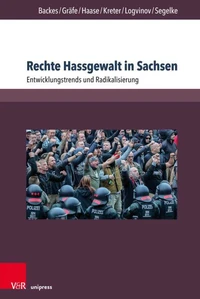Sachsen – Eine Hochburg des Rechtsextremismus?
Par : , , , ,Formats :
Disponible dans votre compte client Decitre ou Furet du Nord dès validation de votre commande. Le format PDF est :
- Compatible avec une lecture sur My Vivlio (smartphone, tablette, ordinateur)
- Compatible avec une lecture sur liseuses Vivlio
- Pour les liseuses autres que Vivlio, vous devez utiliser le logiciel Adobe Digital Edition. Non compatible avec la lecture sur les liseuses Kindle, Remarkable et Sony
 , qui est-ce ?
, qui est-ce ?Notre partenaire de plateforme de lecture numérique où vous retrouverez l'ensemble de vos ebooks gratuitement
Pour en savoir plus sur nos ebooks, consultez notre aide en ligne ici
- Nombre de pages406
- FormatPDF
- ISBN978-3-647-36328-8
- EAN9783647363288
- Date de parution17/02/2020
- Protection num.pas de protection
- Taille36 Mo
- Infos supplémentairespdf
- ÉditeurVandenhoeck & Ruprecht
Résumé
In many cases, the Free State of Saxony is seen as a stronghold of right-wing extremism and right-wing populism with prominent results of far-right parties, distinct xenophobic violent scenes and brisk right street protest. By drawing interregional comparisons with western as well as eastern countries, the authors of this volume test the "stronghold Saxony"-thesis on all levels (attitudes, voting behaviour, protest cultures, militant scenes, discourses, ideologies).
Thereby, they are looking for potential causes of possible saxon particularities. This volume creates thus a multifaceted picture of right-wing extremism and right-wing populism in Saxony.
Thereby, they are looking for potential causes of possible saxon particularities. This volume creates thus a multifaceted picture of right-wing extremism and right-wing populism in Saxony.
In many cases, the Free State of Saxony is seen as a stronghold of right-wing extremism and right-wing populism with prominent results of far-right parties, distinct xenophobic violent scenes and brisk right street protest. By drawing interregional comparisons with western as well as eastern countries, the authors of this volume test the "stronghold Saxony"-thesis on all levels (attitudes, voting behaviour, protest cultures, militant scenes, discourses, ideologies).
Thereby, they are looking for potential causes of possible saxon particularities. This volume creates thus a multifaceted picture of right-wing extremism and right-wing populism in Saxony.
Thereby, they are looking for potential causes of possible saxon particularities. This volume creates thus a multifaceted picture of right-wing extremism and right-wing populism in Saxony.





